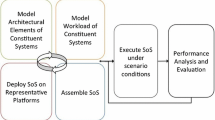Abstract
Safety-critical systems typically operate in unpredictable environments. Requirements for safety and reliability are in conflict with those for real-time responsiveness. Due to unpredictable environmental needs there is no static trade-off between measures to accommodate the conflicting objectives. Instead every feature or operating system service has to be adaptive. Finally, for any design problem, there cannot be any closed-form (formal) approach taking care at the same time of (external) time constraints or deadlines, and synchronization requirements in distributed design. The reason is that these two aspects are causally independent. - In this situation we worked out a heuristic experimental, performance-driven and performance-based methodology that allows in an educated way to start with a coarse system model, with accurate logical expectations regarding its behavior. Through experiments these expectations are validated. If they are found to successfully stand the tests extended expectations and model features are generated for refining the previous design as well as its performance criteria. The refinement is done in such a way that the previous experimental configurations are extreme model cases or data profiles which both logically and experimentally are to reproduce the behavior of the previous modeling step. Thus the novel performance aspects or tendencies could then unambiguously be attributed to the influences of the refined model features. We termed this methodology Incremental Experimentation. As a general methodology it relies on a principle of comparative performance studies rather than on realistic data for narrow application ranges. The paper describes how we applied a 5-step design and refinement procedure for developing, analyzing, and evaluating our distributed operating system MELODY that exhibits novel services for supporting real-time and safety-critical applications in unpredictable environments. Experimental set-ups and theme-related findings are discussed in particular.
Similar content being viewed by others
References
D.C. Daniels, “The Design and Analysis of Protocols for Distributed Resource Scheduling under Real-Time Constraints”; Ph.D. Dissertation; Wayne State University, June 1992
J.W. Havender, “Avoiding Deadlocks in Multitasking Systems”; IBM Systems Journal, Vol. 7, No. 2, (1968)
D. Haban, K. Shin, “Application of Real-Time Monitoring to Scheduling Tasks with Random Execution Times”; IEEE Trans. on Software Engineering; Vol. 16 No. 12; 1990
F. Jahanian, R. Rajkumar, S. Raju, “Runtime Monitoring of Timing Constraints in Distributed Real-Time Systems”; Real-Time Systems; Vol. 7. No. 3 (1994)
R. Rajkumar, “Task Synchronization in Real-Time Systems”; Ph.D. Dissertation, Department of Electrical and Computer Engineering, Canegie Mellon University, 1989
H.F. Wedde, G.S. Alijani, D. Huizinga, G. Kang, B. K. Kim, “MELODY: A Completely Decentralized Adaptive File System for Handling Real-Time Tasks in Unpredictable Environments”; Real-Time Systems; Vol. 2 No. 4(1990)
H.F. Wedde, D.C. Daniels, D. Huizinga, “Efficient Distributed Resource Scheduling for Adaptive Real-Time Operating System Support”; Springer Lecture Notes in Computer Science; Vol. 497 (1991)
H.F. Wedde, B. Korel, J.A. Lind, “Highly Integrated Task and Resource Scheduling for Mission-Critical Systems”; Proc. of the EUROMICRO'93 Workshop on Real-Time Systems; Oulu, Finland, June 1993
H.F. Wedde, “Real-Time Operating Systems and Software: State-of-the-Art and Future Challenges”; Encyclopedia of Microcomputers, Vol. 14 (S. 255), Marcel Dekker Inc., New York, NY 1994
H.F. Wedde, J.A. Lind, A. Eiss, “Achieving Dependability in Safety-critical Operating Systems Through Adaptability and Large-Scale Functional Integration”; Proc. of the ICPADS'94 International Conference on Parallel and Distributed Systems; Hsinchu, Taiwan, December, 1994
H.F. Wedde, M. Xu, “Scheduling Critical and Sensitive Tasks with Remote Requests in Safety-Critical Systems”; Proc. of the EUROMICRO'92 Workshop on Real-Time Systems; Athens, Greece, June 1992
J. Xu, D.L. Parnas, “On Satisfying Timing Constraints in Hard Real-Time Systems” IEEE-TSE Vol.19 No.1 (1993)
Author information
Authors and Affiliations
Rights and permissions
About this article
Cite this article
Wedde, H.F., Lind, J.A. Building Large, Complex, Distributed Safety-Critical Operating Systems. Real-Time Systems 13, 277–302 (1997). https://doi.org/10.1023/A:1007915628098
Issue Date:
DOI: https://doi.org/10.1023/A:1007915628098




